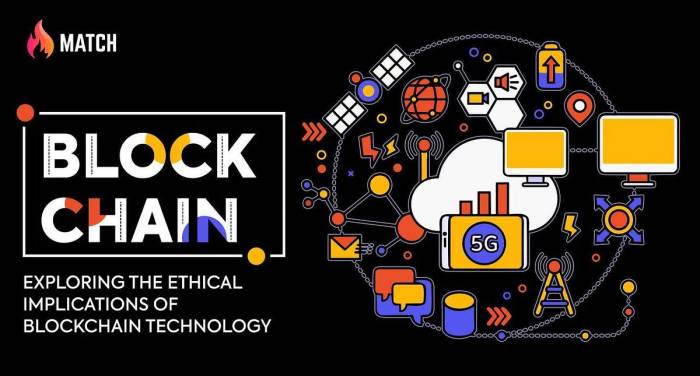What are the ethical implications of using blockchain technology? This question is crucial as blockchain’s transformative potential intersects with complex ethical dilemmas. From data privacy concerns to environmental impacts and the potential for increased economic inequality, the decentralized nature of blockchain presents both unprecedented opportunities and significant challenges. Understanding these implications is vital for responsible development and deployment of this powerful technology.
Blockchain technology, with its promise of transparency and security, is rapidly changing various sectors. However, its decentralized and immutable nature raises several ethical questions. This exploration delves into the key ethical considerations surrounding data privacy, environmental sustainability, accessibility, transparency, economic equality, and intellectual property rights within the blockchain ecosystem. We’ll examine both the potential benefits and drawbacks, offering insights into how these challenges can be addressed to ensure responsible innovation.
Intellectual Property Rights: What Are The Ethical Implications Of Using Blockchain Technology?

Blockchain’s decentralized and immutable nature presents both opportunities and challenges for intellectual property (IP) rights. While it offers potential for enhanced security and transparency in IP management, it also introduces complexities regarding ownership, enforcement, and the very definition of IP in a digital, distributed environment. This section explores these multifaceted implications.
Challenges in Protecting Intellectual Property on Blockchain
Protecting IP on a decentralized blockchain is tricky because of its inherent openness. While a blockchain can record ownership claims, it doesn’t inherently enforce them. Anyone can still copy and distribute copyrighted material, even if the blockchain shows someone else owns it. Furthermore, the anonymity often associated with blockchain transactions can make it difficult to track down infringers.
The lack of a central authority to mediate disputes adds another layer of complexity. Existing legal frameworks struggle to fully address these novel challenges, leading to uncertainty and potential loopholes.
Copyright Infringement and Plagiarism on Blockchain Platforms
The ease of sharing digital assets on blockchain platforms, particularly through NFTs, increases the risk of copyright infringement and plagiarism. While the blockchain can record the original creation and ownership, it doesn’t prevent unauthorized copies from being made and distributed. The decentralized nature of many blockchain networks makes it difficult to monitor and control the distribution of copyrighted material.
This necessitates the development of robust mechanisms for detecting and addressing infringement within these platforms, potentially relying on community moderation and technological solutions. The potential for widespread plagiarism is also a concern, as the ease of access to digital assets makes it simpler to reproduce and redistribute them without attribution.
Legal and Ethical Considerations Surrounding NFTs and Intellectual Property, What are the ethical implications of using blockchain technology?
NFTs (Non-Fungible Tokens) have become a popular way to represent ownership of digital assets, including artwork, music, and other forms of intellectual property. However, the legal and ethical implications of NFTs are still evolving. The mere existence of an NFT does not automatically grant the owner all IP rights associated with the underlying asset. For example, an NFT representing a digital painting might grant ownership of the specific token, but it might not grant the exclusive right to reproduce or sell prints of the artwork.
This creates ambiguity and necessitates clear legal frameworks to define the scope of rights granted by an NFT. Ethical considerations also arise concerning the environmental impact of NFT creation and the potential for exploitation of artists through unfair contracts or practices.
Blockchain-Based Solutions for Intellectual Property Management
Several blockchain-based solutions aim to improve IP management. Some platforms use blockchain to create a secure and transparent record of IP ownership, allowing creators to easily prove their ownership and track the usage of their work. Others use smart contracts to automate licensing agreements, ensuring that creators receive payments automatically when their work is used. These solutions can enhance transparency and efficiency in IP management, reducing the risk of disputes and facilitating collaborations.
For example, a platform could use a blockchain to register trademarks, copyrights, and patents, making it easier to verify ownership and track the usage of intellectual property. Another example could involve a decentralized autonomous organization (DAO) managing the licensing and distribution of creative works, ensuring fair compensation for creators.
Ethical Implications of Using Blockchain for Intellectual Property Management
The ethical implications of using blockchain for IP management are complex and multifaceted. While blockchain can enhance transparency and security, it also raises concerns about access, control, and the potential for misuse. A crucial ethical consideration is ensuring that blockchain-based IP management systems do not exacerbate existing inequalities in access to technology and resources. The potential for the concentration of power in the hands of a few large players is also a concern.
Furthermore, the lack of clear legal frameworks surrounding the use of blockchain for IP management creates uncertainty and potential for exploitation. A balanced approach is needed, one that leverages the benefits of blockchain technology while mitigating its potential risks and ensuring fair and equitable access to IP protection.
In conclusion, the ethical implications of blockchain technology are multifaceted and require careful consideration. While blockchain offers transformative potential across numerous sectors, its inherent characteristics necessitate a proactive approach to mitigating potential risks. Addressing concerns related to data privacy, environmental impact, accessibility, transparency, economic inequality, and intellectual property rights is crucial for harnessing blockchain’s benefits responsibly and equitably. Ongoing dialogue and collaboration between developers, policymakers, and the wider community are essential to navigate these complexities and ensure a future where blockchain serves humanity ethically and sustainably.
Notice Investigating the scalability challenges faced by various blockchain platforms. for recommendations and other broad suggestions.
Understand how the union of Understanding the concept of blockchain forks and their implications. can improve efficiency and productivity.